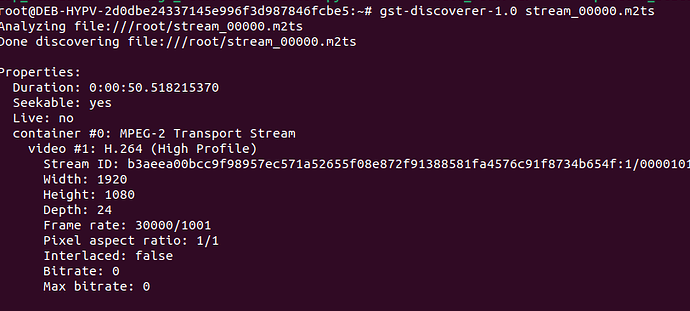Nikita
October 30, 2024, 7:54am
1
Hi,.m2ts files using multifilesink, splitting them every 5 minutes. Here’s the pipeline I’m using:
GST_DEBUG="multifilesink*:4" gst-launch-1.0 udpsrc address=239.202.122.214 port=6310 do-timestamp=true timeout=60000000000 buffer-size=0 caps="application/x-rtp,media=(string)video,clock-rate=(int)90000,encoding-name=(string)MP2T,payload=(int)103" ! rtpbin name=recv_rtp ! watchdog timeout=300000 ! tee name=raw_stream raw_stream. ! rtpmp2tdepay2 ! video/mpegts,packetsize=192 ! queue ! multifilesink next-file=5 max-file-duration=300000000000 location=stream_%05d.m2ts
The pipeline runs without errors and successfully splits the files at the expected intervals. However, when I analyze the first file (stream_00000.m2ts) using gst-discoverer-1.0, I notice a discrepancy between the file duration logged by multifilesink and the actual duration shown by gst-discoverer.
Logs from multifilesink :
Output from gst-discoverer:
It reports a duration of only 50.52 seconds-
Any insights, suggestions, or examples of similar pipelines that work would be greatly appreciated. Thank you!
Hi @Nikita
I tested the following pipelines:
UDPSINK
gst-launch-1.0 videotestsrc is-live=true pattern=ball \
! videoconvert ! queue \
! x264enc tune=zerolatency bitrate=500 \
! mpegtsmux ! rtpmp2tpay \
! udpsink host=127.0.0.1 port=5000
UDPSRC
GST_DEBUG="multifilesink*:4" gst-launch-1.0 udpsrc port=5000 \
do-timestamp=true timeout=60000000000 buffer-size=0 \
caps="application/x-rtp,media=(string)video,\
clock-rate=(int)90000,encoding-name=(string)MP2T,\
payload=(int)103" ! rtpmp2tdepay \
! decodebin ! videoconvert \
! x264enc ! mpegtsmux ! queue \
! multifilesink next-file=5 max-file-duration=300000000000 \
location=stream_%05d.m2ts
With the following logs
0:00:06.486880059 326127 0x624d4a0fe2a0 INFO multifilesink gstmultifilesink.c:1082:gst_multi_file_sink_open_next_file:<multifilesink0> opening file stream_00000.m2ts
0:05:06.529198818 326127 0x624d4a0fe2a0 INFO multifilesink gstmultifilesink.c:725:gst_multi_file_sink_write_buffer:<multifilesink0> new_duration: 300033015636, max. duration 300000000000
0:05:06.529816244 326127 0x624d4a0fe2a0 INFO multifilesink gstmultifilesink.c:1082:gst_multi_file_sink_open_next_file:<multifilesink0> opening file stream_00001.m2ts
^Chandling interrupt.
Interrupt: Stopping pipeline ...
Execution ended after 0:06:07.652052387
Setting pipeline to NULL ...
Freeing pipeline ...
st-discoverer-1.0 stream_00000.m2ts
Analyzing file:///tmp/stream_00000.m2ts
Done discovering file:///tmp/stream_00000.m2ts
Properties:
Duration: 0:05:00.042515370
Seekable: yes
Live: no
container #0: MPEG-2 Transport Stream
video #1: H.264 (High 4:4:4 Profile)
Stream ID: a27ecf4b193cfcfde136f34bb1991263db7dcec3424b9d8225e550e211667010:1/00000041
Width: 320
Height: 240
Depth: 30
Frame rate: 30/1
Pixel aspect ratio: 1/1
Interlaced: false
Bitrate: 0
Max bitrate: 0
I hope this helps.
Nikita
November 5, 2024, 5:28am
3
hi @eduardo.salazar rtpmp2tdepay2 element (which supports a 192-byte packet size) instead of rtpmp2tdepay (which only supports a 188-byte packet size).
Thanks!

